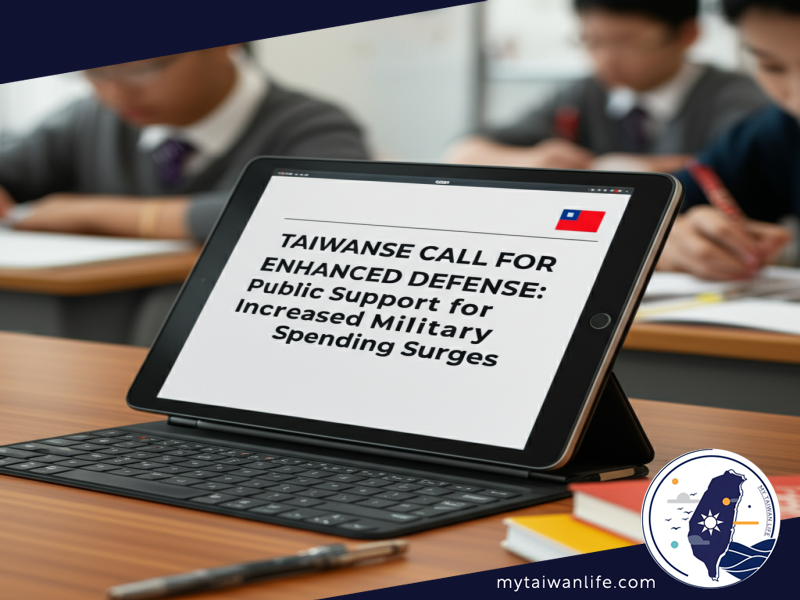Taiwanese Call for Enhanced Defense: Public Support for Increased Military Spending Surges
Growing Concerns and Shifting Perceptions Shape Defense Priorities

Taipei, Taiwan – A recent survey reveals a significant shift in public opinion within Taiwan, with a majority expressing support for bolstering the island's defense capabilities. Commissioned by the Institute for National Defense and Security Research (INDSR), the poll highlights evolving attitudes towards national security, international relations, and defense spending.
The survey indicates that fifty-one percent of Taiwanese support increasing Taiwan's defense budget, with forty-four percent favoring a "significant increase." This marks a notable rise of four percentage points since January 2025, representing the first time support has exceeded the fifty percent threshold. The INDSR, a think tank affiliated with Taiwan's Ministry of National Defense, conducted the study.
Published in a report authored by Lee Kuan-chen (李冠成) of the INDSR, the findings also reveal a tempered view on the immediacy of conflict. Sixty-five percent of respondents consider a near-term attack by China's People's Liberation Army (PLA) "unlikely" within the next five years.
"Despite China's ongoing military intimidation, public expectations of a short-term invasion remain calm and rational," Lee wrote in a summary of the results.
The survey identified "China's threat to Taiwan" as the primary national security concern for thirty-three percent of respondents over the next five years, outpacing the "declining birth rate crisis" at twenty-seven percent and "economic stagnation" at eighteen percent.
While overall concern about threats from China has increased, public confidence in Taiwan's armed forces is declining. Only fourteen percent expressed "strong confidence," down from twenty percent in September 2024, while those with "no confidence" rose from twenty-five to thirty percent. Lee suggested that "recent espionage cases within the military may have heightened concerns over security management."
The report also examined perceptions of U.S.-Taiwan relations. Thirty-six percent of respondents believe these relations will worsen under U.S. President Donald Trump's leadership, a twelve-percentage-point increase since January 2025. Lee attributed this shift to "uncertainties in Trump's Taiwan policy," despite Washington's continued signals of support.
Despite these concerns, public support for U.S.-Taiwan military cooperation remains strong, with fifty-nine percent agreeing that Taiwan should continue purchasing arms and military equipment from the U.S. However, confidence in Washington's security commitment is weakening; only fourteen percent believe the U.S. would "definitely intervene militarily," down from nineteen percent in March 2024. Forty-seven percent stated the U.S. is "unlikely to intervene."
Regarding funding, forty-nine percent of respondents favor using "special budgets" to raise defense spending, compared to forty-two percent who support "tax hikes" and thirty-one percent who favor "resource reallocation." Lee wrote that the preference for special budgets reflects the public's desire for methods "that do not impact other public expenditures."
The survey, conducted by National Chengchi University's (NCCU) Election Study Center from March 4 to 9, gathered 1,285 valid responses through randomized telephone interviews with residents aged 18 and over, with a margin of error of plus or minus 2.73 percent at the 95 percent confidence level.
Other Versions
Los taiwaneses piden más defensa: Aumenta el apoyo público al incremento del gasto militar
Les Taïwanais demandent un renforcement de la défense : Le soutien de l'opinion publique à l'augmentation des dépenses militaires progresse
Error: All DeepL API keys exceeded 95% usage.
Error: All DeepL API keys exceeded 95% usage.
Error: All DeepL API keys exceeded 95% usage.
Panawagan ng Taiwanese para sa Mas Mahusay na Depensa: Ang Suporta ng Publiko para sa Pagtaas ng Gastos sa Militar ay Lumalaki
Error: All DeepL API keys exceeded 95% usage.
ไต้หวันเรียกร้องเสริมสร้างการป้องกันประเทศ: การสนับสนุนจากสาธารณชนสำหรับการเพิ่มงบประม�
Đài Loan Kêu Gọi Tăng Cường Quốc Phòng: Sự Ủng Hộ Của Công Chúng Đối Với Việc Tăng Chi Tiêu Quân Sự Tăng Vọt

